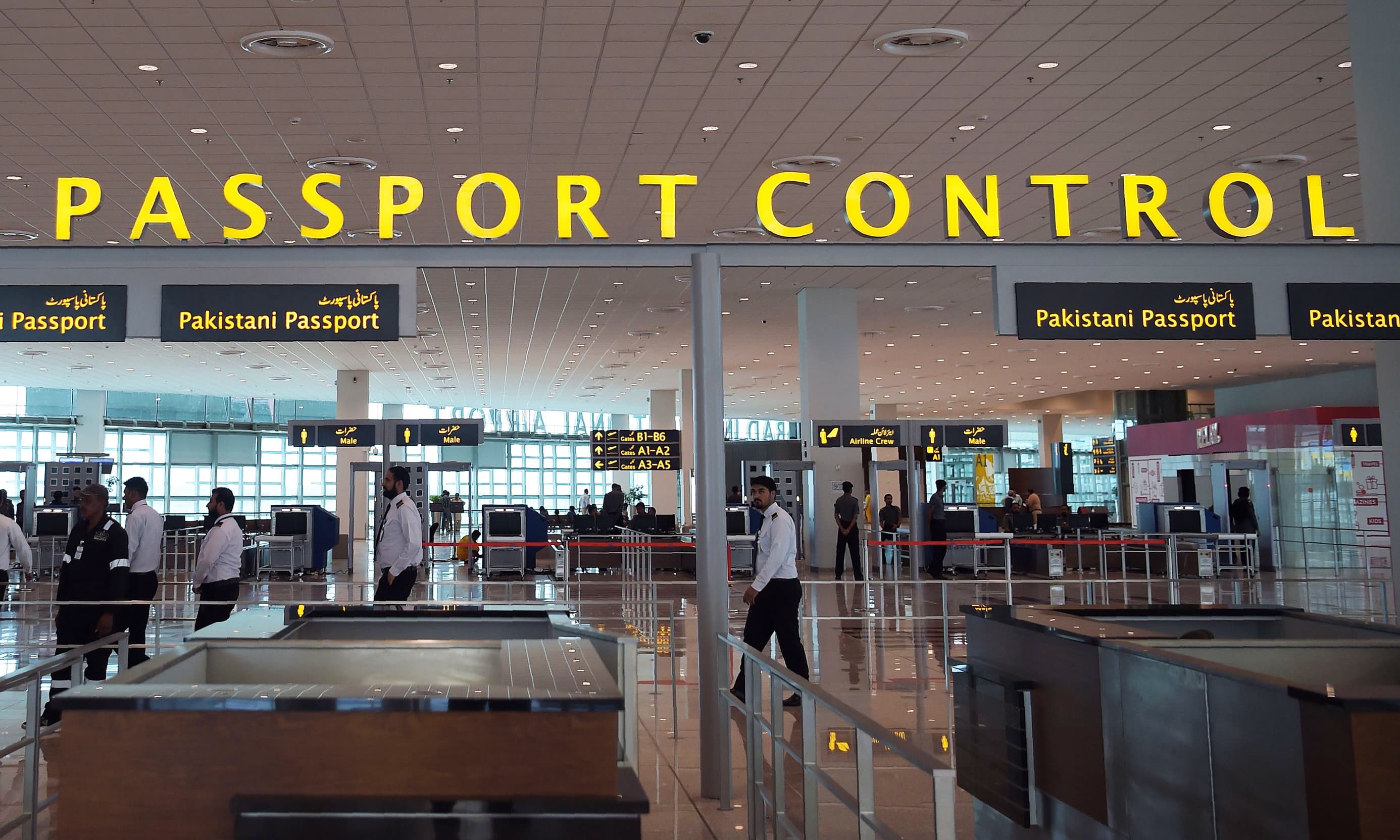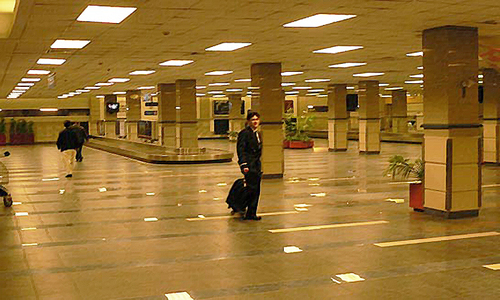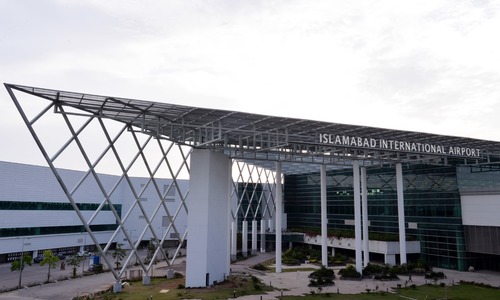The newly constructed Islamabad International Airport (IIA) was inaugurated by Prime Minister Shahid Khaqan Abbasi — after going through its share of hiccups — on Tuesday.
The plan to construct a new airport in Islamabad had been conceived just under forty years ago in 1980 but work on the international-standard greenfield airport hit a number of snags and delays over the years.

The Y-shaped airport is located 20 kilometres from Zero Point Islamabad and over 25km from Saddar, Rawalpindi, and is set to be the largest airport in the country, designed to facilitate 15 million passengers annually in the first phase, which will increase to 25m after its expansion.
IIA today saw its first commercial touchdown with Pakistan International Airlines (PIA) flight PK-300 landing at the new airport at 11:15am.
According to PIA Spokesman Mashood Tajwar, the national flag carrier's second commercial flight PK-301 will take off for Karachi at around 12:30pm.
Strict security measures were in place as PM Abbasi arrived at the airport along with other officials for the ceremony. The inauguration was initially supposed to take place on April 20 but it was delayed until May 3 due to certain technical problems and security issues.
Speaking at the inauguration ceremony, Abbasi lauded the efforts of Sardar Mehtab, Irfan Illahi and Air Marshal Salam and other officials for their efforts to complete the airport project.

"Nothing is impossible, but this [constructing this airport] seemed like it was," the prime minister said. "But we have managed to complete this project as well."
He further said that although Pakistan's "liberal, open sky scheme" has been criticised, the policy has been kept in place because the government believes that the "passengers should have choices".
"Aviation is a challenging, dynamic field. It keeps changing rapidly and if we don't change ourselves we will be left behind," he stressed.
"It is very easy to criticise and hurl accusations," he said, adding that those in government have to deal with challenges unknown to critics.
Full flight operations will be shifted to the new airport on May 3. All commercial and VIP flights from Benazir Bhutto International Airport (BBIA) will be moved to the new airport.
International carriers, including Emirates Airlines, Qatar Airways, Thai Airways, China Airlines, Oman Air, Etihad Airways, Saudi Airways, Gulf Air, Kuwait Airways and Turkish Airlines, operate flights to and from Islamabad along with PIA, Shaheen Air and Air Blue.
Prior to the inauguration, the Pakistan Air Force had lent a hand to the Civil Aviation Authority (CAA) for smooth and safe conduct of operations at the new airport.
A C-130 flight with passengers and luggage on board had landed at the newly constructed runway on Friday to assess its instrument landing pattern and the quality of the landing strip.
Earlier, PAF aircraft, including the lightweight super Mushshak trainer and Hercules transport aircraft, had also landed at the runway.
For air traffic deconfliction, PAF in consultation with the CAA air traffic controllers has readjusted its flying training areas and routes for smooth approach paths of the new airport.
Moreover, PAF has also established an air traffic control squadron manned by qualified controllers to ensure the smooth air traffic flow at the airport.
Confusion over a name
Reaching a decision over a final name of the airport proved to be a major challenge for the authorities.
On April 20, former Senate chairman Raza Rabbani, after hearing that that an adviser to the prime minister has announced that Benazir Bhutto International Airport would be named Islamabad International Airport, in a letter urged the government to reconsider its decision and "withdraw this uncalled for and inappropriate decision".
However, the official name of the airport had not been decided until last week after the prime minister rejected three names that had been proposed by Nawaz Sharif-constituted ministerial committee for Islamabad’s new airport.
IIA building and facilities
Besides a four-level terminal building, two runways, taxiways, apron and two parking bays for wide-body aircraft A-380 have been built. There will also be a cargo terminal, fuel farm, air traffic control complex as well as a fully-functional state-of-the-art firefighting station and modern rescue facilities.
The new airport will have 15 air-conditioned jetways or passenger boarding bridges, 13 remote bays for larger aircraft and 7 remote bays for ATR and other smaller planes, in addition to four cargo bays.
Of the 15 jetways – two have been specified for the wide-body aircraft A380. The Benazir Bhutto International Airport had no boarding bridges and suffered from a chronically inadequate immigration desk. The small number of immigration officers could not handle the influx of thousands of passengers flying in every day.
The new airport will have five conveyer belts to assist passengers in claiming their luggage and personal belongings after they exit their planes. All 15 bays will have separate lounges to make it easier for travellers to navigate to the correct waiting areas.
Breakdown of the terminal building
At level 1 – there are the international and domestic passengers’ arrival area and collection bays for baggage. Airline offices and the engineering department will also be housed on the first level.
At level II – there are the domestic arrivals and departure lounges, boarding bridges, visitors’ gallery, car parking, and Immigration counters for international passengers.
At level III – there are international and domestic check-ins – baggage drop after check-in security scanning, international immigration departure and other airlines offices.
At level IV – there are state lounges and commercially important persons (CIP) lounges, in addition, a crew briefing hall.
There will be as many as 28 escalators, six service lifts. 24 elevators for passengers have been installed in the terminal building in addition to 4 inclined travellators (moving walkways) and 10 horizontal.
25 restrooms for passengers have been built in the terminal building, however, there is no facility for transit passengers to deposit their luggage.
Instead, transit passengers will have to carry their luggage with them while waiting for their connecting flights. The Benazir Bhutto Airport did not have this facility either.
A huge parking area for 2200 to 2500 vehicles has been constructed, in addition to a 175-staff car parking bay. And two parking areas have been allocated for state lounge guests. There are nine exit and entry gates to the airport.
Other amenities include dedicated charging stations for passengers to fuel up their electronic devices. In addition, there are charging boxes for cell-phones that will be operated by high-tech fingerprint recognition systems for keeping the phones safe while they are being charged.
There will also be a mini-cinema for travellers to relax and watch a movie before embarking on their connecting flights, as well as a food court with a children’s play area.
From Islamabad, the airport is connected to the Kashmir Highway, while people in Rawalpindi will be able to access it via the Grand Trunk Road. There is no dedicated public transport available to the airport; however, government authorities have plans to inaugurate a metro-bus service for passengers soon.
Besides all other facilities, 18 water tube-wells and three water dams have been built for the new airport. However, arrangements for the availability of clean drinking water have yet to be finalised.
Security
More than 500 Airport Security Force personnel will be required to be deployed at the new IIA to ensure safety for all passengers.
Security officials, however, have already expressed concern over the existing situation of funnel areas of the new airport which are close to the Motorway where lights could be a security hazard.
Though more than 85 security towers have been built around the airport to ensure that nobody from outside can enter the area, several of the towers lack basic facilities like toilets/washroom, lighting and restrooms.
“No clean water is available to drink at the security towers, and it’s difficult to keep visual contact from the towers to the airport,” a security official – requesting to remain unnamed — lamented speaking of the lapses in security management.
The security staff camp is located 12 kilometres away from the airport which security officials consider a cause for concern. The airport itself lacks proper rescue and evacuation mechanisms.
There are also no alternate routes for VIPs, which according to security officials would have the potential to create traffic bottlenecks as well as security hazards.
“The Benazir Bhutto International Airport was a smaller airport, which meant that security management was not so complicated. Considering the new airport is significantly larger, the security detail needs to be much more comprehensive. Given the fact that the location of the airport is also in an area where there have been reports of miscreant activities, security arrangements are not water-tight” a security official said.
He said at the new airport, security management systems, CCTV, and public address systems have been installed complimented with all-night patrolling. There are two bomb pit facilities each on the departure and international sections of the airport.
Flight kitchen
Besides the on-site hotel, a flight kitchen, post office facilities and ATMs have yet to be provided to passengers using the new airport. However, the PIA spokesman said that the flight kitchen located at the old Benazir Bhutto International airport, which is more than 30 kilometres away from the new airport will be used for cooking meals, which will be transported in trucks to the new airport.
















































